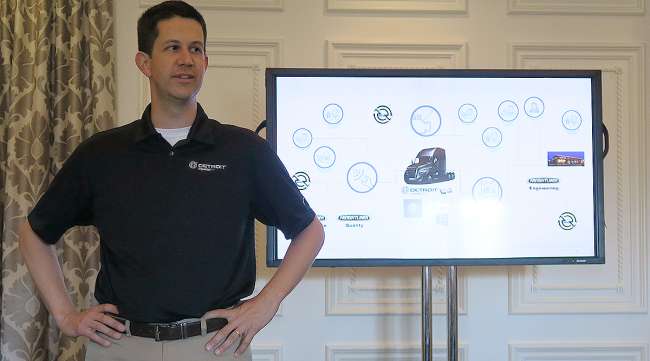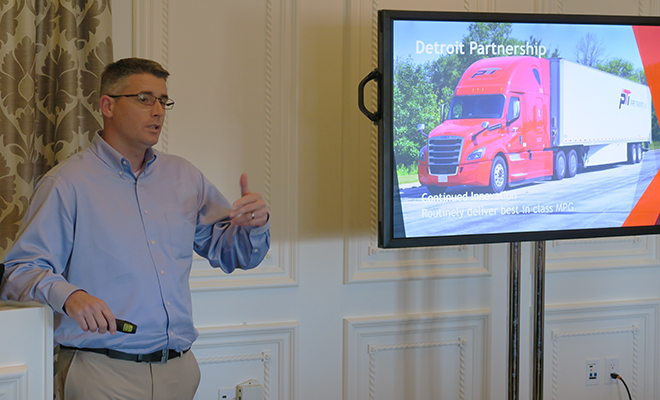Managing Editor, Features and Multimedia
DTNA Expands Connected Truck Services

YOUNTVILLE, Calif. — Daimler Trucks North America continues to expand its connected-vehicle services to provide fleets with a broader arsenal of information and analytical tools they can use to make better business decisions.
The truck and engine maker has launched its Detroit Connect web portal, where fleet managers can monitor the performance of their Freightliner and Western Star trucks powered by Detroit engines.
DTNA executives also outlined plans to further expand the platform later this year, saying that over-the-air software and firmware updates, and new analytics software are coming that will provide data on fuel economy and safety events.
The original equipment manufacturer wants to use its connected truck services to be a “trusted source of data” for its customers, said Matt Pfaffenbach, vice president of operations at Detroit. That means not only delivering data, but also helping fleets understand where it originated, how it’s calculated and what it means.
“We see it really as our role as the OEM to provide that translation,” Pfaffenbach said during a July 27 press event here.
CASCADIA: Freightliner Trucks accelerates production of updated model
The new Detroit Connect portal is a hub for existing and future connected vehicle services, including the Virtual Technician remote diagnostics program, which provides fault-code notifications from afar. Fleets can use the information to better plan repairs and prevent vehicle downtime, the company said.
Detroit Connect Analytics is coming soon in two stages. It will be a new back-office service for fleets to monitor fuel mileage and safety event reporting, and to find opportunities for improvement. It will first become available in October for new Cascadias, and in December for older Cascadias.
Paper Transport Inc. of De Pere, Wis., is among the pilot customers testing Detroit Connect Analytics.

Deppeler by Seth Clevenger/Transport Topics
“If you like data and you like trucks, this is really cool stuff,” said Dan Deppeler, vice president of maintenance at the fleet, which operates 730 trucks primarily in the Midwest and Southeast.
The analytics tools create “coachable opportunities,” both for safety and fuel economy, he said.
Deppeler said Paper Transport typically sees a 1.2 mile-per-gallon variation in fuel economy for the same type of truck hauling the same freight in the same geography, illustrating the strong influence of driver behavior on fuel efficiency.
Using the analytics software for targeted driver coaching, the fleet hopes to reduce significantly that variation, he said.
Deppeler also said the quality of fault descriptions and recommended actions within Virtual Technician has improved during the past 12-to-18 months, with fewer false positives.
Keeping the truck running and preventing drivers from getting stranded out on the road is critically important for driver satisfaction, he said. “More time at home is the single biggest thing … we feel we can do for our drivers.”
DTNA also announced plans to launch a Detroit Connect mobile application in the fall for Apple and Android devices. That app will enable fleet managers and others to access the same data available in the web portal while away from their desks.
The Portland, Ore-based OEM is also beginning the rollout of Detroit Connect Remote Updates. Fleets with new Freightliner Cascadias outfitted with Detroit engines will be able to remotely access Detroit Diesel Engine Control performance reports over the air through the Detroit Connect portal beginning late summer.
The DDEC reports, which provide data such as such as fuel efficiency, time spent in top gear and time spent in cruise control, are designed to help fleet managers better understand vehicle performance and improve operational efficiency.
By making those reports available through the web portal, fleets no longer will need to bring the vehicle into the shop to extract that information.
Next, DTNA plans to roll out remote engine parameter programming and firmware updates to new Cascadia customers later this year.
“We were the first OEM to offer a service like Virtual Technician for heavy-duty trucks to our customers,” said Kary Schaefer, DTNA general manager of marketing and strategy. “We’ve continued to evolve that in a way that … provides a platform for over-the-air updates, an interface that offers real-time information regarding service events … and analytics that provide actionable intelligence to drive business decisions and results.”
Detroit Connect’s expansion into fuel mileage and safety event reporting moves the platform into territory traditionally occupied by third-party telematics suppliers such as Omnitracs and PeopleNet.
While acknowledging some overlap, Pfaffenbach said he sees Detroit Connect’s services complementing the offerings of fleet telematics companies.
“We think we’re the best when it comes to knowledge about the truck itself,” he said. “The space that we are not experts in is on the fleet management side of telematics services.”
DTNA has said it plans to enable Detroit Connect customers to add integrations with software from third-party technology providers as part of the platform’s continued expansion.




